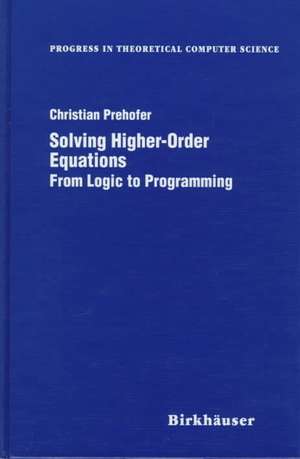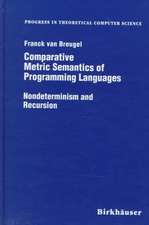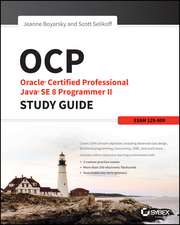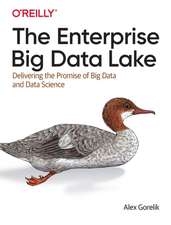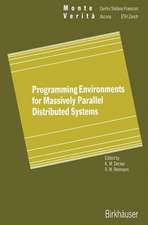Solving Higher-Order Equations: From Logic to Programming: Progress in Theoretical Computer Science
Autor Christian Prehoferen Limba Engleză Hardback – 18 dec 1997
| Toate formatele și edițiile | Preț | Express |
|---|---|---|
| Paperback (1) | 640.84 lei 6-8 săpt. | |
| Birkhäuser Boston – 21 oct 2012 | 640.84 lei 6-8 săpt. | |
| Hardback (1) | 648.26 lei 6-8 săpt. | |
| Birkhäuser Boston – 18 dec 1997 | 648.26 lei 6-8 săpt. |
Din seria Progress in Theoretical Computer Science
- 20%
 Preț: 644.98 lei
Preț: 644.98 lei - 20%
 Preț: 645.47 lei
Preț: 645.47 lei - 20%
 Preț: 650.59 lei
Preț: 650.59 lei - 20%
 Preț: 601.00 lei
Preț: 601.00 lei - 20%
 Preț: 1000.38 lei
Preț: 1000.38 lei - 20%
 Preț: 648.95 lei
Preț: 648.95 lei - 20%
 Preț: 650.08 lei
Preț: 650.08 lei - 20%
 Preț: 656.03 lei
Preț: 656.03 lei - 20%
 Preț: 658.33 lei
Preț: 658.33 lei - 20%
 Preț: 646.30 lei
Preț: 646.30 lei - 20%
 Preț: 650.73 lei
Preț: 650.73 lei - 20%
 Preț: 988.32 lei
Preț: 988.32 lei -
 Preț: 379.86 lei
Preț: 379.86 lei - 15%
 Preț: 584.92 lei
Preț: 584.92 lei - 20%
 Preț: 589.87 lei
Preț: 589.87 lei -
 Preț: 378.34 lei
Preț: 378.34 lei -
 Preț: 386.61 lei
Preț: 386.61 lei -
 Preț: 385.47 lei
Preț: 385.47 lei - 15%
 Preț: 540.24 lei
Preț: 540.24 lei
Preț: 648.26 lei
Preț vechi: 810.33 lei
-20% Nou
Puncte Express: 972
Preț estimativ în valută:
124.04€ • 129.52$ • 102.43£
124.04€ • 129.52$ • 102.43£
Carte tipărită la comandă
Livrare economică 15-29 aprilie
Preluare comenzi: 021 569.72.76
Specificații
ISBN-13: 9780817640323
ISBN-10: 0817640320
Pagini: 188
Ilustrații: IX, 188 p.
Dimensiuni: 155 x 235 x 19 mm
Greutate: 0.49 kg
Ediția:1998
Editura: Birkhäuser Boston
Colecția Birkhäuser
Seria Progress in Theoretical Computer Science
Locul publicării:Boston, MA, United States
ISBN-10: 0817640320
Pagini: 188
Ilustrații: IX, 188 p.
Dimensiuni: 155 x 235 x 19 mm
Greutate: 0.49 kg
Ediția:1998
Editura: Birkhäuser Boston
Colecția Birkhäuser
Seria Progress in Theoretical Computer Science
Locul publicării:Boston, MA, United States
Public țintă
ResearchCuprins
1 Introduction.- 2 Preview.- 2.1 Term Rewriting.- 2.2 Narrowing.- 2.3 Narrowing and Logic Programming.- 2.4 ?-Calculus and Higher-Order Logic.- 2.5 Higher-Order Term Rewriting.- 2.6 Higher-Order Unification.- 2.7 Decidability of Higher-Order Unification.- 2.8 Narrowing: The Higher-Order Case.- 3 Preliminaries.- 3.1 Abstract Reductions and Termination Orderings.- 3.2 Higher-Order Types and Terms.- 3.3 Positions in ?-Terms.- 3.4 Substitutions.- 3.5 Unification Theory.- 3.6 Higher-Order Patterns.- 4 Higher-Order Equational Reasoning.- 4.1 Higher-Order Unification by Transformation.- 4.2 Unification of Higher-Order Patterns.- 4.3 Higher-Order Term Rewriting.- 5 Decidability of Higher-Order Unification.- 5.1 Elimination Problems.- 5.2 Unification of Second-Order with Linear Terms.- 5.3 Relaxing the Linearity Restrictions.- 5.4 Applications and Open Problems.- 6 Higher-Order Lazy Narrowing.- 6.1 Lazy Narrowing.- 6.2 Lazy Narrowing with Terminating Rules.- 6.3 Lazy Narrowing with Left-Linear Rules.- 6.4 Narrowing with Normal Conditional Rules.- 6.5 Scope and Completeness of Narrowing.- 7 Variations of Higher-Order Narrowing.- 7.1 A General Notion of Higher-Order Narrowing.- 7.2 Narrowing on Patterns with Pattern Rules.- 7.3 Narrowing Beyond Patterns.- 7.4 Narrowing on Patterns with Constraints.- 8 Applications of Higher-Order Narrowing.- 8.1 Functional-Logic Programming.- 8.2 Equational Reasoning by Narrowing.- 9 Concluding Remarks.- 9.1 Related Work.- 9.2 Further Work.
